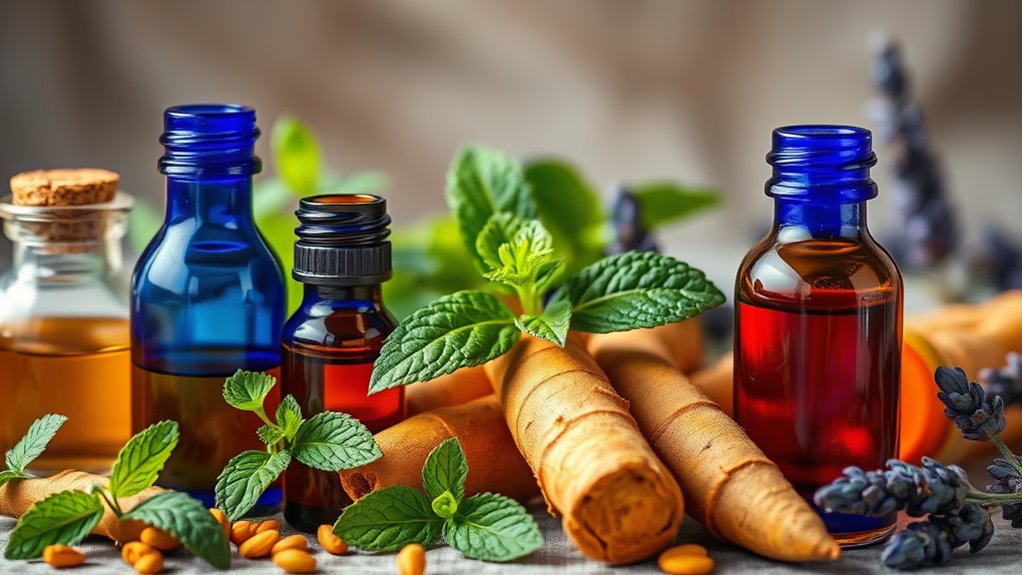Many believe headache relief blends offer instant cures, but that’s a myth. Effectiveness varies; some herbs require consistent use, and the placebo effect can influence perceived relief. Essential oils like peppermint can help if used safely, yet they’re not guaranteed cures. Over-the-counter products work quickly but aren’t always enough alone. To better understand what truly helps and what’s just a myth, explore how natural remedies and medical treatments compare and what risks to watch for.
Key Takeaways
- Herbal tea blends are not instant cures; their effectiveness varies and often requires consistent use.
- Essential oils like peppermint and lavender can help headache relief when used properly and safely.
- Over-the-counter remedies provide quick relief but may be influenced by placebo effects; realistic expectations are necessary.
- Natural remedies may offer relief but lack rigorous scientific evidence; they should complement medical treatments.
- Dietary changes alone do not prevent all headaches; triggers are multifactorial and require personalized management.
Common Assumptions About Herbal Tea Blends for Headaches
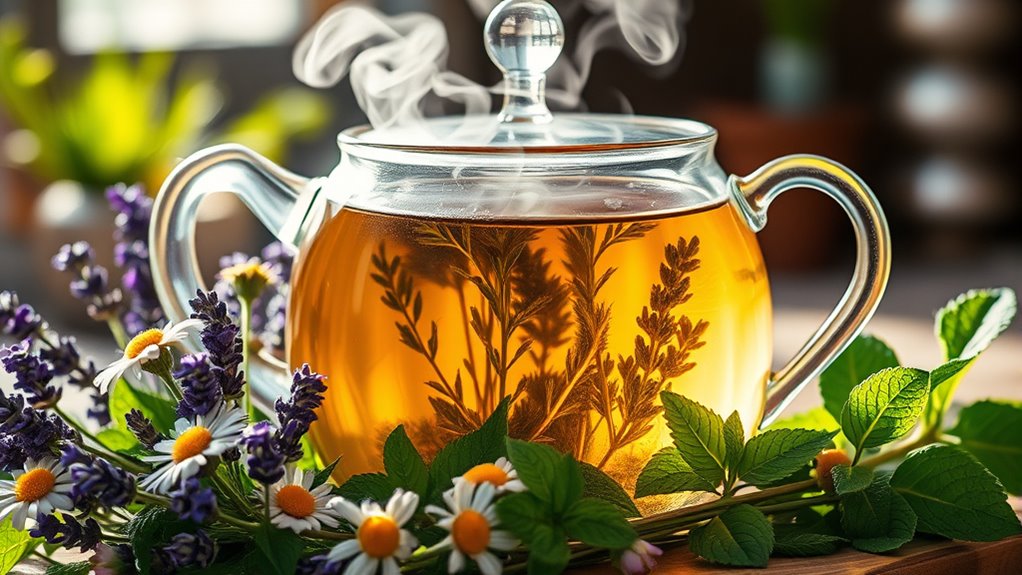
Many people assume that herbal tea blends for headaches are a quick fix or a natural remedy that works instantly. However, herbal potency varies widely between blends, and not all herbs deliver immediate relief. Some may have a mild effect or require consistent use over time to show benefits. You might also believe in the placebo effect, thinking that simply drinking the tea will relieve your headache, regardless of its actual medicinal properties. While some herbs are genuinely effective, others rely more on your mind’s expectation of relief. Additionally, understanding the herbal potency and how it varies can help set realistic expectations for herbal tea efficacy. It’s important to understand that herbal teas should complement other treatments and lifestyle changes, rather than serve as an instant cure. Trusting in their genuine herbal potency is key to managing headaches effectively.
The Role of Essential Oils in Headache Relief: What’s True?
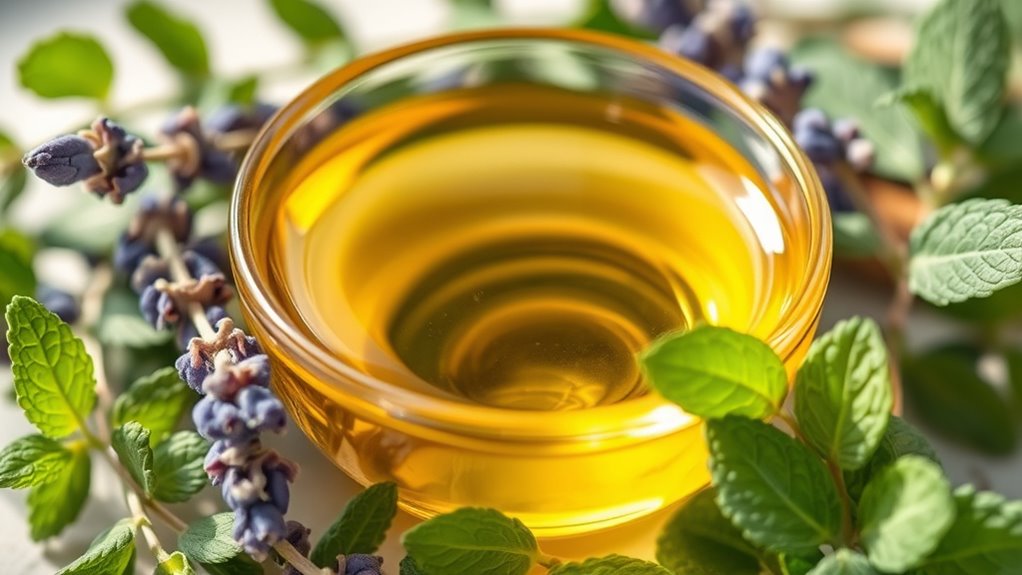
While herbal teas can offer some headache relief, essential oils are often highlighted for their potent and targeted effects. Many believe aromatherapy safety is straightforward, but improper use can cause skin irritation or allergic reactions. That’s why essential oil dilution is vital — never apply oils directly to your skin without proper dilution. When used correctly, essential oils like peppermint or lavender can provide quick relief by relaxing muscles or reducing tension. Additionally, incorporating Natural Language Processing (NLP) techniques can help analyze the effectiveness of different essential oils based on user feedback. However, always follow guidelines for essential oil safety and avoid overuse. Remember, the effectiveness varies from person to person, and essential oils aren’t a guaranteed cure. Proper dilution and cautious application are key to safely experiencing their potential benefits in headache relief.
Over-the-Counter Products: Do They Really Help?
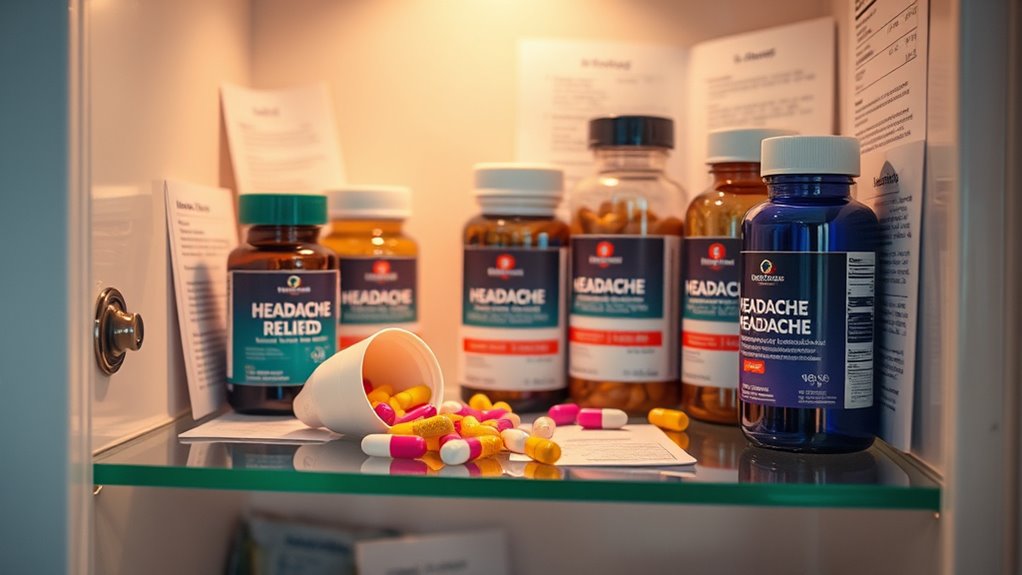
Over-the-counter (OTC) headache remedies are widely used because they offer convenient and quick relief, but their effectiveness can vary from person to person. While many turn to medications like ibuprofen or acetaminophen, some also explore alternative therapies such as herbal supplements or acupuncture. It’s important to recognize that placebo effects can play a significant role in perceived relief; if you believe a product will help, you might experience a reduction in headache symptoms even if the remedy isn’t directly effective. This doesn’t mean OTC products are useless, but it highlights that their success isn’t solely based on active ingredients. Your individual response depends on various factors, including your physiology and psychological expectations, making it essential to approach these remedies with both awareness and realistic expectations. Understanding the benefits of curiosity can also encourage you to explore additional options for managing headaches and overall well-being.
The Effectiveness of Natural Remedies Versus Medical Treatments
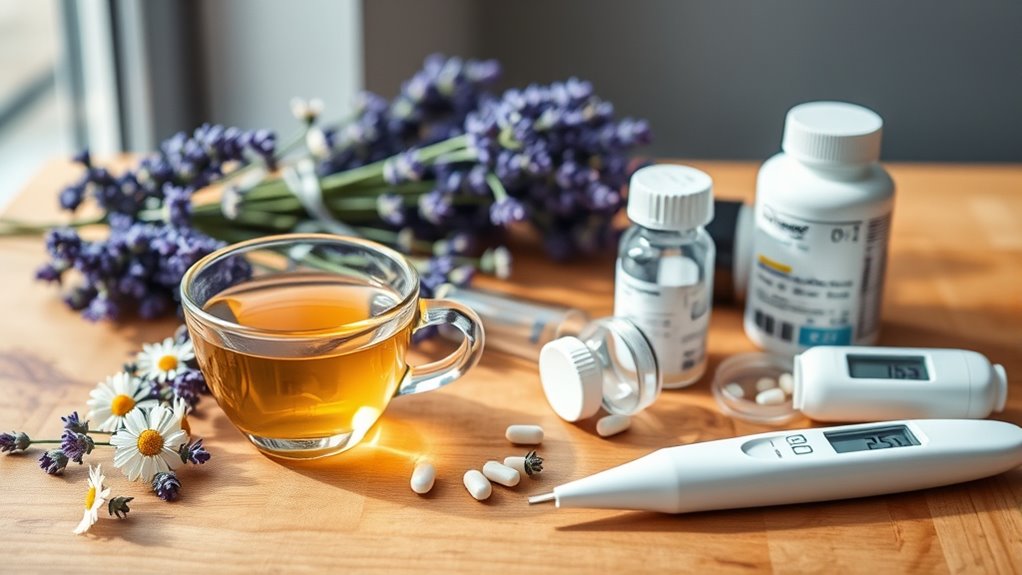
Natural remedies like herbal supplements, acupuncture, and relaxation techniques can offer relief for some headache sufferers, but their effectiveness varies widely. While these approaches may improve herbal efficacy in certain individuals, scientific backing is often limited. Medical validation of natural remedies is inconsistent, making it hard to gauge their true benefits. You should consider how individual factors influence outcomes, such as headache type and severity. Some studies support herbal efficacy for specific herbs, yet many lack rigorous clinical trials. Always consult healthcare professionals before replacing medical treatments. Remember, natural remedies may complement, but not replace, proven medical interventions. Being informed about the evidence can help you make better decisions for headache management.
Natural remedies may help some headaches, but their effectiveness varies and should complement medical care.
- Variability in herbal efficacy among individuals
- Limited scientific validation of many natural remedies
- The importance of consulting healthcare providers
- Complementary use alongside medical treatments
- The need for more rigorous clinical trials
Myths Surrounding Dietary Changes and Headache Prevention
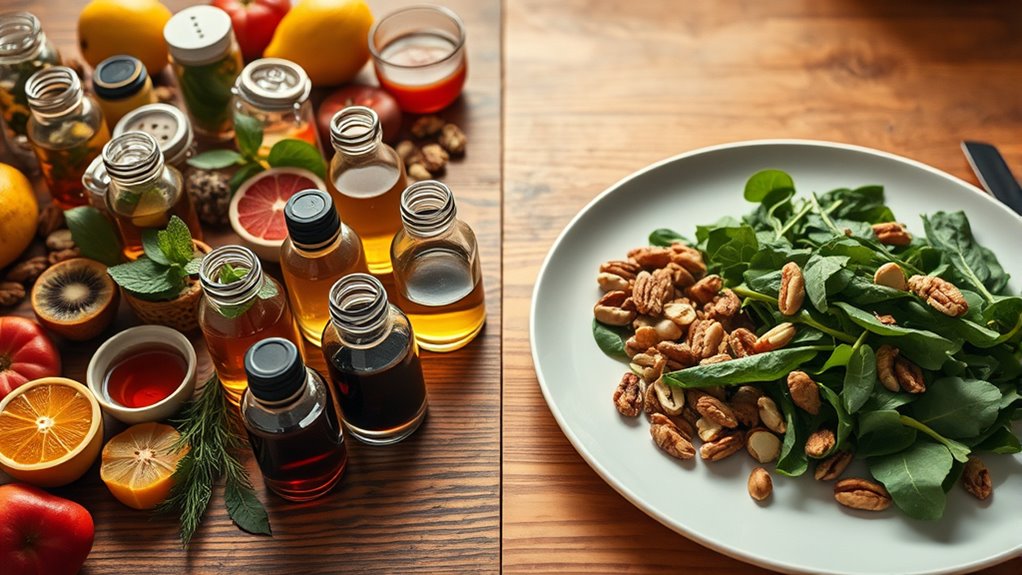
Many people believe that making specific dietary changes can completely prevent headaches, but this idea is often a myth. Nutritional misconceptions lead some to think avoiding certain foods guarantees headache relief, but individual triggers vary. Lifestyle misconceptions also play a role; believing that diet alone solves headaches oversimplifies the issue. In reality, a balanced approach that includes stress management, hydration, and proper sleep is more effective. Here’s a breakdown of common myths:
| Myth | Reality | Explanation |
|---|---|---|
| Cutting out all caffeine prevents headaches | Moderate caffeine intake is acceptable | Excessive restriction may cause withdrawal headaches |
| Eliminating sugar cures migraines | No universal link | Trigger varies per person |
| Only food causes headaches | Multiple factors involved | Diet is one aspect, not a sole cause |
| Supplements replace healthy habits | Supplements aren’t a substitute | Overall lifestyle matters most |
Additionally, understanding the individual triggers can help tailor effective headache management strategies.
Safety and Risks Associated With Homemade Headache Blends
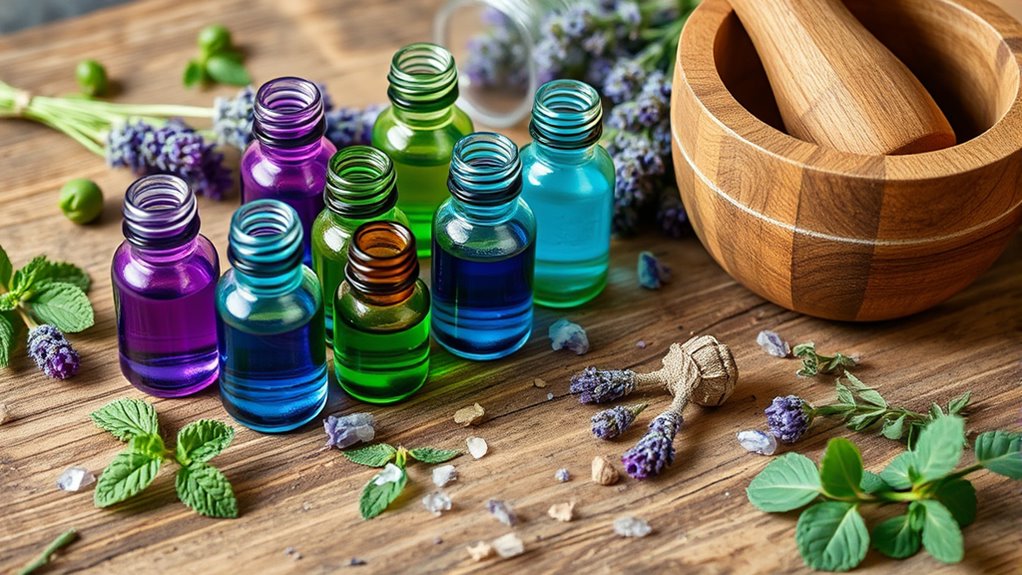
While homemade headache blends can seem like a safe and simple solution, they carry potential risks if not prepared carefully. Improper use can lead to adverse reactions, especially if ingredient safety isn’t verified. Variations in herbal potency mean that some ingredients may be too concentrated, causing irritation or toxicity. Without proper knowledge, you might accidentally combine herbs that interact negatively or trigger allergies. It’s essential to contemplate that natural doesn’t always mean safe, especially with potent herbs. Misuse can worsen headaches or produce side effects. To minimize risks, always research ingredient safety, use accurate dosages, and consult a healthcare professional before experimenting. Remember, even natural remedies require caution to avoid unintended health issues. Additionally, understanding herbal potency can help prevent overdose and adverse effects.
Frequently Asked Questions
Can Herbal Blends Cure Chronic Migraines Permanently?
Herbal blends can’t cure chronic migraines permanently, but they may help manage symptoms. Alternative therapies like herbal remedies can provide relief, but you should always consider herbal safety before use. Consult with a healthcare professional to ensure these blends are appropriate for your condition and won’t interfere with medications. While they might reduce migraine frequency or intensity, they aren’t a guaranteed permanent solution, so ongoing medical advice is essential.
Are Natural Remedies Suitable for Everyone With Headaches?
Think of natural remedies as keys to a door—you might find one that fits perfectly, or it could be the wrong size. You, as an individual, have unique differences that influence how you respond to herbal options. While some find relief, others discover remedy limitations. It’s essential to consult with a healthcare professional to make certain that natural remedies are appropriate for your specific headache type and health conditions.
How Long Does It Take for Herbal Teas to Work?
Herbal teas typically take about 20 to 30 minutes to work, depending on their herbal potency and how you brew the tea. For the best results, use fresh herbs and follow proper tea brewing techniques, like steeping at the right temperature and time. Remember, individual responses vary, so you might notice relief sooner or later. Consistent use can enhance effectiveness for headache relief.
Are There Any Side Effects From Essential Oil Inhalation?
Think of inhaling essential oils as a delicate dance—while it can soothe your senses, there are essential oil risks involved. You might experience allergic reactions, headaches, or respiratory irritation if you skip inhalation precautions. Always dilute properly and avoid direct inhalation from concentrated bottles. Being cautious helps prevent potential side effects, ensuring you enjoy the benefits without risking your health.
Do Dietary Changes Prevent All Types of Headaches?
Dietary changes can help prevent some headaches by avoiding common dietary triggers like caffeine, alcohol, or certain processed foods. Ensuring you’re not suffering from nutritional deficiencies, such as magnesium or B vitamins, also plays a role. However, they won’t prevent all types of headaches, especially those caused by stress, hormonal changes, or medical conditions. You should consider a thorough approach and consult a healthcare professional for persistent or severe headaches.
Conclusion
Remember, steering headache relief is like tending a delicate garden—you need to understand what’s rooted in fact and what’s just weeds. For example, I once relied solely on herbal teas, expecting miracles, only to discover they complemented other treatments. While natural remedies can be helpful, they’re not a one-size-fits-all fix. Stay informed, consult professionals, and treat your head like a precious plant—carefully and with insight. That’s the best way to nurture true relief.

